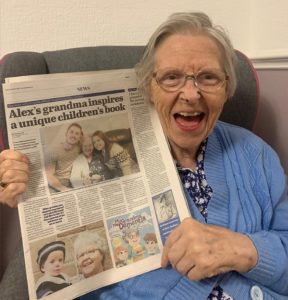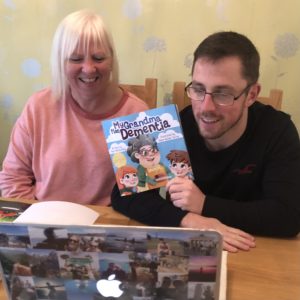Dementia is a syndrome – usually of a chronic or progressive nature – in which there is deterioration in cognitive function (i.e. the ability to process thought) beyond what might be expected from normal ageing. It affects memory, thinking, orientation, comprehension, calculation, learning capacity, language, and judgement.
Dementia is one of the major causes of disability and dependency among older people worldwide. It can be overwhelming, not only for the people who have it but also for their carers and families.
Alex Winstanley’s grandmother, Mary Perry, had dementia. Growing up, Alex and his grandmother had a very close and loving relationship. Alex also wanted to show children that, despite having dementia, people can still be loved and are able to give lots of love back.

Alex’s grandmother, Mary Perry with a newspaper clipping about the book.
“I used my experiences of growing up seeing my grandma show the signs and symptoms of dementia, that were often confusing for everyone.” Alex said, “My Mum (Gwen) was her only carer and so I learnt a lot about caring for people with long-term health conditions from her.”
In order to perfectly capture dementia and transform it into a storybook for kids, Alex consulted with a range of people with expertise and experiences on dealing with the disease to make sure that the book represented as many people as possible, whilst staying as true as possible to his grandma’s story.
Alex also talks about the fear children would usually get when visiting relatives in care homes. Mary lived the best years of her life in Windsor House where Alex and his family could she was getting so much stimulation from being a part of a community. The friendly and inviting atmosphere of care homes is also what Alex wanted children to learn from his book.

Alex and Mum, Gwen, during a live reading of the book.
Children would respond in a number of different ways about what’s happening to someone they love. Fear of what will happen to the person, confusion, grief, and sadness would often lead to anxiety and irritation as they find it hard to communicate their feelings and maybe too afraid to talk about their worries.
Parents would also often have a hard time explaining the situation to their children.
“It can be a very lonely place for parents who are caring for a grandparent and trying to explain a condition like dementia to their children.” Alex said “I would encourage parents to talk to their children about dementia so that they can continue to have a positive relationship with their family member who is living dementia, whilst understanding the best ways to offer support”
The best way to relieve stress about dealing with dementia is through finding support. For now, the non-profit organisation Happy Smiles Training CIC (www.happysmilestraining.co.uk), is using this book for intergenerational reading projects between schools and care homes.
Mary Perry passed away just before Christmas and was unable to see the release of the book. However, her legacy lives on as her story continues to touch families and educate children about dementia.
Based on a city where the mountain meets the sea and where antique houses line the streets, my mind is free to wonder, to wander and to write.































